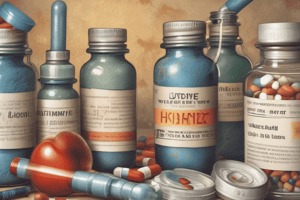Podcast
Questions and Answers
What is the role of thrombin in coagulation?
What is the role of thrombin in coagulation?
- It converts prothrombin to thrombin
- It facilitates vasospasm to reduce blood flow
- It is involved in the generation of fibrin to form the mesh-like matrix of the blood clot (correct)
- It is responsible for the formation of a platelet plug
Which type of anticoagulant inhibits the action of the coagulation factors?
Which type of anticoagulant inhibits the action of the coagulation factors?
- Unfractionated heparin (correct)
- LMWHs
- Fondaparinux
- Aspirin
What is the function of vasospasm in the context of coagulation?
What is the function of vasospasm in the context of coagulation?
- To reduce blood flow and facilitate platelet aggregation (correct)
- To activate coagulation and lead to the formation of a fibrin clot
- To convert prothrombin to thrombin
- To initiate the process of fibrinolysis
What is the role of tissue factors in coagulation?
What is the role of tissue factors in coagulation?
Which factor is responsible for converting prothrombin to thrombin?
Which factor is responsible for converting prothrombin to thrombin?
What is the role of anticoagulant drugs?
What is the role of anticoagulant drugs?
Which factor plays a key role in coagulation by generating fibrin?
Which factor plays a key role in coagulation by generating fibrin?
What is the function of vasospasm in relation to coagulation?
What is the function of vasospasm in relation to coagulation?
What is the role of tissue factors in coagulation?
What is the role of tissue factors in coagulation?
What is the function of unfractionated heparin in the heparin family of anticoagulants?
What is the function of unfractionated heparin in the heparin family of anticoagulants?
What is the main role of vasospasm in relation to coagulation?
What is the main role of vasospasm in relation to coagulation?
Which enzyme is ultimately responsible for the generation of fibrin in coagulation?
Which enzyme is ultimately responsible for the generation of fibrin in coagulation?
What is the function of LMWHs in the heparin family of anticoagulants?
What is the function of LMWHs in the heparin family of anticoagulants?
What is the role of tissue factors in coagulation?
What is the role of tissue factors in coagulation?
What is the primary function of anticoagulant drugs such as warfarin?
What is the primary function of anticoagulant drugs such as warfarin?
Flashcards are hidden until you start studying
Study Notes
Coagulation Factors
- Thrombin plays a crucial role in coagulation by converting fibrinogen into fibrin, leading to clot formation.
- Factor Xa is responsible for converting prothrombin to thrombin.
Anticoagulants
- Anticoagulant drugs, such as warfarin, inhibit the action of coagulation factors to prevent clot formation.
- Unfractionated heparin and Low Molecular Weight Heparins (LMWHs) are types of anticoagulants that inhibit thrombin and factor Xa.
Tissue Factors
- Tissue factors play a key role in coagulation by initiating the clotting cascade.
- Tissue factors activate factor VII, which then activates other coagulation factors.
Vasospasm
- Vasospasm helps to reduce blood flow to the affected area, allowing the clotting process to occur.
- The primary function of vasospasm is to constrict blood vessels and facilitate coagulation.
Fibrin Generation
- Thrombin is ultimately responsible for generating fibrin in coagulation.
- Fibrin is essential for clot formation and wound healing.
Studying That Suits You
Use AI to generate personalized quizzes and flashcards to suit your learning preferences.



